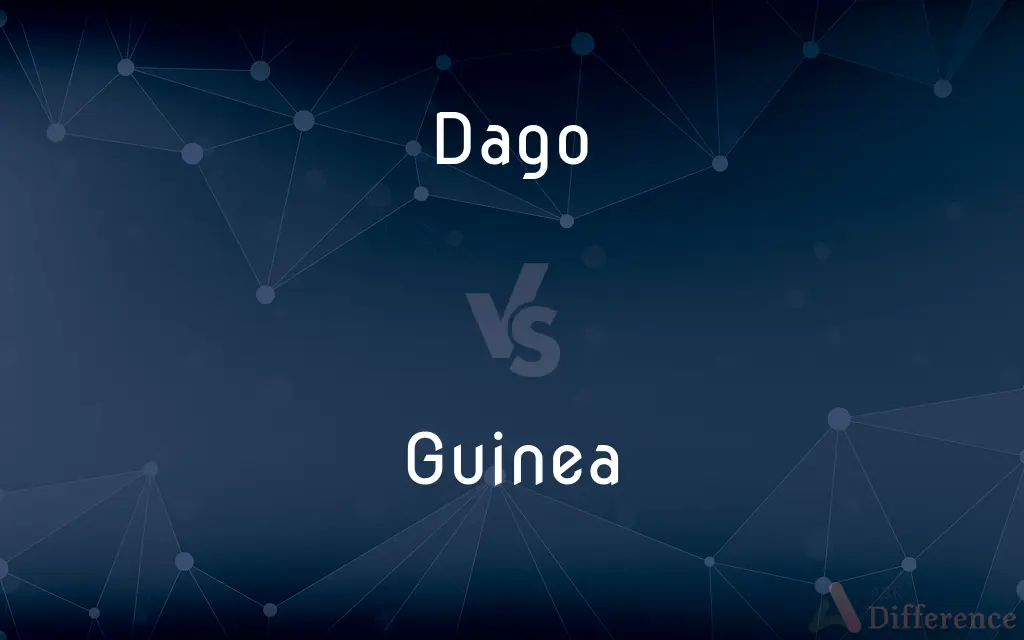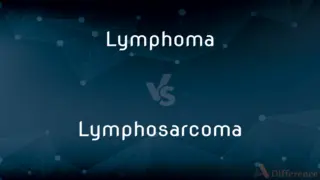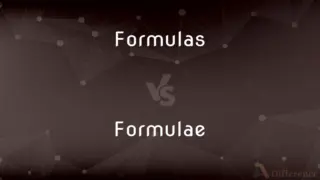Dago vs. Guinea — What's the Difference?
By Tayyaba Rehman — Updated on October 12, 2023
Dago and Guinea are both derogatory slang terms used in the U.S. to describe people of Italian descent, with "Dago" also referencing Spanish and Portuguese people. Using them is offensive and promotes stereotypes.

Difference Between Dago and Guinea
Table of Contents
ADVERTISEMENT
Key Differences
Dago is a derogatory term that historically has been used in the English-speaking world to refer to Italians, Spaniards, or Portuguese people. This term is believed to have its origins from the Spanish name "Diego," which is equivalent to James in English. Over time, the term became an ethnic slur in parts of the English-speaking world, particularly in the U.S., against people from southern Europe.
On the other hand, Guinea is a derogatory slang primarily targeting people of Italian descent in the U.S. Its origin is a bit unclear, but some believe it may be derived from "Guinea Negro," referring to the African region of Guinea. The term possibly denoted the dark complexion of southern Italians, drawing an ill-founded connection between them and Africans.
While both Dago and Guinea have been used to derogate Italians, the former can also be used against Spanish and Portuguese people. It's essential to understand that using such terms is hurtful and perpetuates negative stereotypes about these communities.
Both terms have been used in various literary works, movies, and other forms of entertainment, sometimes to portray historical prejudice or for shock value. However, in today's multicultural society, the use of Dago and Guinea is widely considered offensive and inappropriate.
Lastly, while these words have specific historical and cultural contexts, they are derogatory. It's crucial for individuals to be aware of the negative connotations and avoid using them to promote a more inclusive and understanding society.
ADVERTISEMENT
Comparison Chart
Targeted Ethnicities
Italians, Spaniards, Portuguese
Italians
Origins
Derived from "Diego"
Possibly from "Guinea Negro"
Geographical Use
Used primarily in the U.S.
Used primarily in the U.S.
Usage in Pop Culture
Found in older literary works/movies
Found in older literary works/movies
Modern Acceptance
Considered offensive
Considered offensive
Compare with Definitions
Dago
A slang term with origins from the Spanish name "Diego".
It's believed Dago evolved from Diego.
Guinea
A word to describe the supposed dark complexion of Southern Italians.
The term Guinea was wrongly used to associate Italians with Africans.
Dago
A pejorative term targeting Southern Europeans.
Discrimination often used the word Dago as a slur.
Guinea
A term historically used in the U.S. to stereotype Italians.
Italian immigrants often heard the term Guinea used against them.
Dago
A word from old movies or literature denoting a stereotyped character.
The character was dubbed as a Dago, reflecting the biases of that era.
Guinea
A derogatory slang term primarily for people of Italian descent.
His neighbors wrongly labeled him as a Guinea.
Dago
A derogatory term for a person of Italian, Spanish, or Portuguese descent.
He was wrongly called a Dago because of his accent.
Guinea
An ethnic slur with possible origins from "Guinea Negro".
Some say the term Guinea is related to the African region.
Dago
An ethnic slur used historically in the English-speaking world.
The term Dago has been discarded from modern respectful vocabulary.
Guinea
Guinea ( (listen)), officially the Republic of Guinea (French: République de Guinée), is a coastal country in West Africa. Formerly known as French Guinea (French: Guinée française), the modern country is sometimes referred to as Guinea-Conakry, after its capital and largest city Conakry, to distinguish it from other countries with "Guinea" in the name and the eponymous region, such as Guinea-Bissau and Equatorial Guinea.
Dago
Used as a disparaging term for a person of Italian, Spanish, or Portuguese descent.
Guinea
A gold coin issued in England from 1663 to 1813 and worth one pound and one shilling.
Dago
A person of Italian, Spanish, Portuguese, Greek, or other Mediterranean descent.
Guinea
The sum of one pound and one shilling.
Dago
A person of Italian descent.
Guinea
Offensive Slang Used as a disparaging term for a person of Italian birth or descent.
Dago
A nickname given to a person of Spanish (or, by extension, Portuguese or Italian) descent.
Guinea
A gold coin originally worth twenty shillings; later (from 1717 until the adoption of decimal currency) standardised at a value of twenty-one shillings.
Dago
Offensive terms for a person of Italian descent
Guinea
Synonym of guinea fowl
Guinea
A person of Italian descent.
Guinea
A district on the west coast of Africa (formerly noted for its export of gold and slaves) after which the Guinea fowl, Guinea grass, Guinea peach, etc., are named.
Guinea
A gold coin of England current for twenty-one shillings sterling, or about five dollars, but not coined since the issue of sovereigns in 1817.
The guinea, so called from the Guinea gold out of which itwas first struck, was proclaimed in 1663, and to go for twenty shillings; but it never went for less than twenty-one shillings.
Guinea
A former British gold coin worth 21 shillings
Guinea
Offensive terms for a person of Italian descent
Guinea
A republic in eastern Africa on the Atlantic; formerly a French colony; achieved independence from France in 1958
Guinea
A west African bird having dark plumage mottled with white; native to Africa but raised for food in many parts of the world
Guinea
A term found in older works to portray Italian characters.
The book depicted the Italian protagonist as a Guinea, showing the time's prejudice.
Common Curiosities
Are there legal implications for using such terms?
While not illegal, using them can be seen as harassment or hate speech in specific contexts.
Is it appropriate to use the terms Dago and Guinea today?
No, both terms are derogatory and considered offensive.
Did these terms impact the Italian community in the U.S.?
Yes, they reflect historical prejudices faced by Italian immigrants.
What's the origin of the term Dago?
It's believed to derive from the Spanish name "Diego".
Were these terms ever used in a non-derogatory way?
Historically, they might have been used casually, but have always carried a derogatory connotation.
Do other languages have similar slurs for ethnicities?
Yes, many languages have derogatory terms for various groups.
How did Guinea become associated with Italians?
Possibly from "Guinea Negro", linking the dark complexion of some Italians with Africans.
Are young generations aware of these terms?
Many might not be, but it's essential to educate them on historical prejudices.
Why are these terms considered offensive?
They perpetuate negative stereotypes and ethnic prejudices.
How can we educate others about the harm of such terms?
Through cultural awareness programs, education, and open dialogues.
How do derogatory terms evolve over time?
Social dynamics, migration, and biases can birth and propagate such terms.
Do movies and literature today still use these terms?
While less common, some works might use them to portray historical biases.
Are there any efforts to reclaim these terms positively?
While some communities reclaim derogatory terms, Dago and Guinea haven't seen widespread reclamation.
How have the Italian, Spanish, and Portuguese communities responded to these terms?
These communities have largely rejected and criticized these terms, advocating for respect.
Is it okay to use these terms if someone from the community uses them?
It's always best to avoid using derogatory language, regardless of context.
Share Your Discovery

Previous Comparison
Lymphoma vs. Lymphosarcoma
Next Comparison
Formulas vs. FormulaeAuthor Spotlight
Written by
Tayyaba RehmanTayyaba Rehman is a distinguished writer, currently serving as a primary contributor to askdifference.com. As a researcher in semantics and etymology, Tayyaba's passion for the complexity of languages and their distinctions has found a perfect home on the platform. Tayyaba delves into the intricacies of language, distinguishing between commonly confused words and phrases, thereby providing clarity for readers worldwide.















































